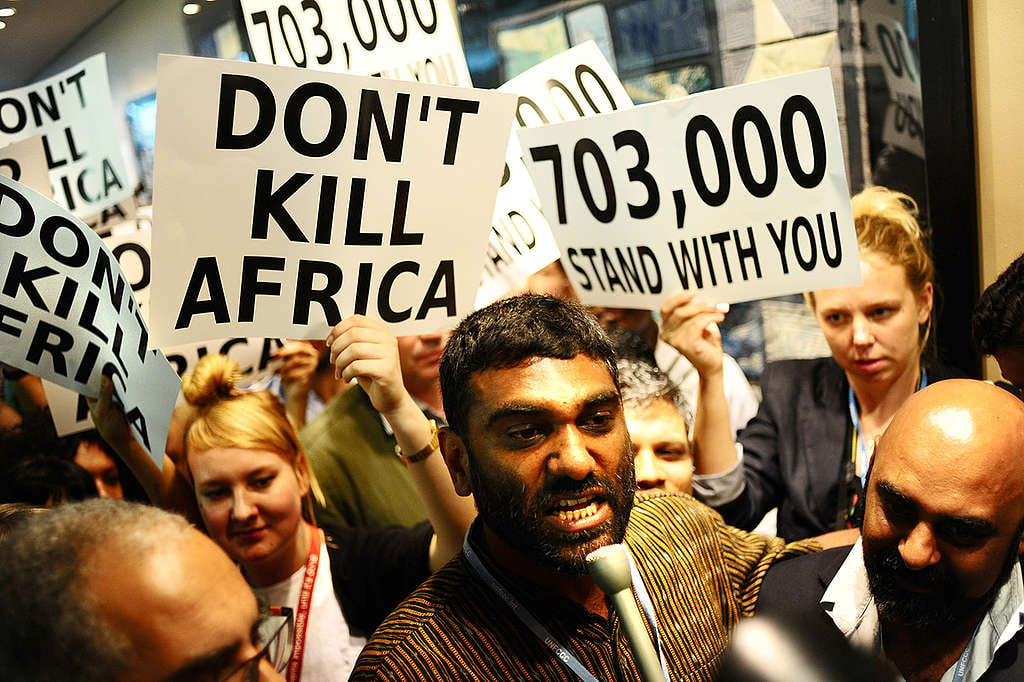Johannesburg, 12 February 2020 – Air pollution from burning fossil fuels – primarily coal, oil, and gas – is attributed to an estimated 4.5 million deaths each year worldwide and estimated economic losses of approximately 3.3% of global GDP, new research from Greenpeace Southeast Asia and the Center for Research on Energy and Clean Air (CREA) shows. The report is the first of its kind to assess the global cost of air pollution from burning fossil fuels.
“There is no longer room to dispute the devastating costs of burning fossil fuels, not just for our rapidly heating planet, but also for our health. The air pollution from fossil fuels is a toxic death-pill as millions of lives across the world are lost prematurely every year, and our risk of stroke, lung cancer and asthma increases due to air pollution. This research may have quantified the cost of air pollution from fossil fuels to approximately 4,5 million deaths per year, but the value of those lost lives can never be quantified,” said Bukelwa Nzimande, Climate and Energy Campaigner for Greenpeace Africa.
Some key findings of the report include:
- An estimated 62 000 asthma-related emergency room visits in South Africa are attributable to PM2.5 and ozone exposure
- An estimated 14 000 preterm births in South Africa are attributable to PM2.5 exposure
- An estimated 13 000 premature deaths were attributable to fossil fuel-related air pollution in South Africa in 2018.
- An estimated 40 000 children die before their fifth birthday globally because of exposure to PM2.5 pollution from fossil fuels, primarily in low-income countries.
- NO2, a byproduct of fossil fuel combustion in vehicles, power plants and factories, is linked to roughly 4 million new cases of asthma in children each year, with approximately 16 million children worldwide living with asthma due to exposure to NO2 pollution from fossil fuels.
- PM2.5 air pollution from fossil fuels is attributed to roughly 1.8 billion days of work absence due to illness each year worldwide, equating to approximate annual economic losses of R1.5 trillion.
- Greenpeace and CREA also created the first-ever live cost of air pollution counter, which uses real-time Air Visual data to calculate the cost of air pollution in cities around the world.
With the State of the Nation Address due tomorrow evening, Greenpeace Africa expects that Cyril Ramaphosa will highlight the crisis and its myriad implications for South Africa’s financial state. The economic impacts of air pollution from fossil fuels is important to consider in the context of Eskom’s massive debt crisis, which amounts to over R400 billion. According to this report, the estimated total cost of air pollution from fossil fuels in South Africa is a staggering R94.7 billion every year.
Phasing out fossil fuels brings financial and health benefits. According to a study published by the United States Environmental Protection Agency, every US$1 invested under the United States Clean Air Act yielded at least US$30 in return.
“The South African air pollution crisis is not unique; it is happening across the world. And across the world, people are demanding solutions. This is a problem that we know how to solve, by urgently shifting away from coal-fired power stations and towards renewable energy in a Just Transition. Greenpeace Africa demands that Minister Barbara Creecy and the National Air Quality Officer take the necessary steps to protect the right of every South African to safe, clean air. Polluters must be held accountable, and must comply with our relatively weak air quality standard,” ended Nzimande.
ENDS
Notes:
Full report available here
Impact attributed to fossil fuel-related air pollution by country/region |
Country/Region | Estimated total cost (Million USD) | Estimated total premature deaths (2018) |
| Low | Middle | High | Low | Middle | High | |
| South Africa | 4,300 | 6,300 | 8,200 | 9,700 | 13,000 | 16,000 |
Media briefing available here
Contacts:
Chris Vlavianos, Greenpeace Africa Communications Officer, [email protected], 079 883 7036
Erin Newport, International Communications Officer, Greenpeace International, [email protected]
 Get Involved
Get Involved
